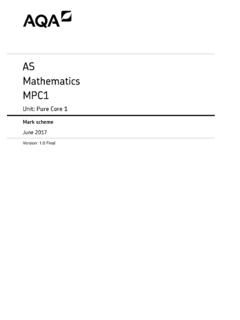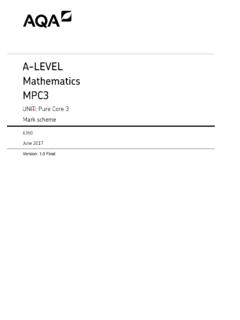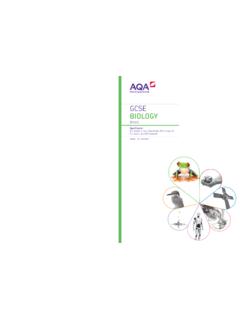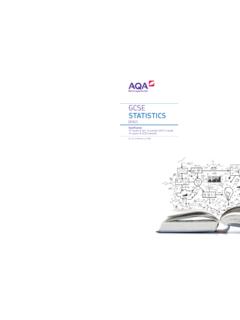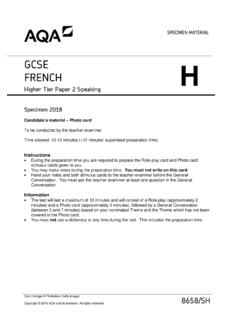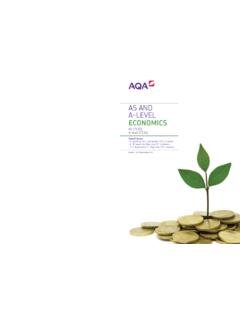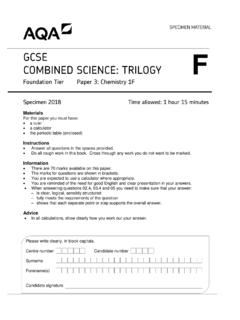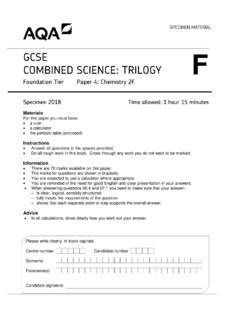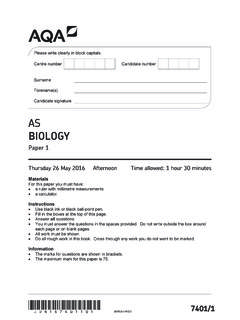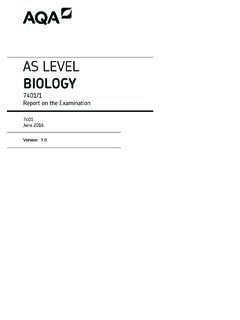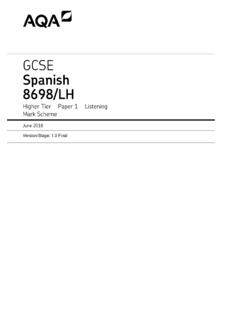Transcription of Mark scheme (Higher) : Paper 1 Listening - June 2019
1 gcse spanish 8698/LH Higher Tier Paper 1 Listening mark scheme June 2019 Version: Final *196G8698/LH/MS* Mark schemes are prepared by the Lead Assessment Writer and considered, together with the relevant questions, by a panel of subject teachers. This mark scheme includes any amendments made at the standardisation events which all associates participate in and is the scheme which was used by them in this examination. The standardisation process ensures that the mark scheme covers the students responses to questions and that every associate understands and applies it in the same correct way. As preparation for standardisation each associate analyses a number of students scripts. Alternative answers not already covered by the mark scheme are discussed and legislated for. If, after the standardisation process, associates encounter unusual answers which have not been raised they are required to refer these to the Lead Assessment Writer.
2 It must be stressed that a mark scheme is a working document, in many cases further developed and expanded on the basis of students reactions to a particular Paper . Assumptions about future mark schemes on the basis of one year s document should be avoided; whilst the guiding principles of assessment remain constant, details will change, depending on the content of a particular examination Paper . Further copies of this mark scheme are available from Listening and Reading tests General principles of marking Non-verbal answers Follow the mark scheme as set out. Verbal answers (English or target language) 1. The basic principle of assessment is that students should gain credit for what they know, understand and can do; provided their written response communicates the required message without ambiguity, it will get the mark. The following guidance should be borne in mind when marking.
3 (a) Credit should be given for all answers which convey the key idea required intelligibly and without ambiguity. This applies whether the answer is in English or target language. A separate assessment of spelling, punctuation and grammar is not required because of the nature of the answers. However, these aspects are an integral part of assessing communication and marks cannot be awarded where errors in spelling, punctuation or grammar lead to a failure to communicate the required information without ambiguity. (b) Where a student has given alternatives or additional information in an answer, the following criteria should be applied: - if the alternative/addition does not contradict the key idea/make it ambiguous, accept - If the alternative/addition contradicts the key idea or makes it ambiguous, reject. (c) Where numbered lines are given within a question/section of a question, credit should be given for correct answers, no matter which line they appear on.
4 (d) Where a question has more than one section (eg (i) and (ii), a candidate may include as part of the answer to one section the information required to answer another section. Eg, in Listening , information required to answer section (ii) might be given as part of the answer to section (i). In such cases, credit should be given for having answered section (ii), provided that no incorrect answer has been given for that section in the correct place on the question Paper . 2. In questions where students are asked to give for example a list of three items, only the first three items they write down should be considered for assessment purposes. 3. No mark scheme can cover all possible answers. When in doubt, look for the key idea. 4. Where a student has crossed out an answer and what was underneath remains legible then it should be marked. When part of an answer is crossed out, then only what remains should be considered.)
5 5../.. means that these are acceptable alternative answers in the mark scheme . (..) means that this information is not needed for full marks to be awarded. 6. In questions which are T/F/? or /X/? in either Section A or Section B, a mix and match approach should be tolerated and credit given where it is clear and unambiguous (eg consistent use by the candidate). If candidates write True instead of V for Verdad in Section B, this should also be credited despite the wrong language being used. 7. The following general principles should be applied in relation to answers in the target language in Section B: Incorrect personal pronouns accept (unless this causes ambiguity) Incorrect possessive adjectives accept (unless this causes ambiguity) Wrong gender accept (unless this causes ambiguity) Infinitive will normally communicate without ambiguity, so should be accepted Wrong tense accept as long as student comprehension is not in question Minor spelling errors accept as long as the answer is understandable with no ambiguity.
6 In Section B, this means that even if the spelling error results in the creation of a word in another language, including English, then provided it is a recognisable attempt at a spelling in the target language, it will be credited. Question Key ideas Accept Reject Mark 01 old toys sick children unwanted toys/games used toys/games old games ill/poorly/unwell children/kids toys(on its own) board games children (on its own) children in need children in hospital 2 Question Key ideas Accept Reject Mark 02 second hand uniform(s) old people s home old uniforms residence for the elderly nursing home (elderly) care home elderly residence uniform(s) (on its own) secondary school uniforms home hospice old residents 2 Question Accept Mark 03 D 1 04 G 1 05 B 1 06 A 1 07 E 1 Question Key ideas Accept Reject Mark 08 kitchen the kitchen is pretty/new/nice/fancy her kitchen kitchen-diner cooking lounge living room everything but the living room the rooms dining room /area 1 Question Key ideas Accept Reject Mark 09 sports centre leisure centre Sports Hall Sports Complex sports centre facilities sports centre is good Gym/sports centre Installations of sport centre sport centre s installations/facilities Installations/equipment in the sports centre Sports centre/leisure centre has great installations The sports centre (installations) Sports centre installation shopping centre good sports facilities sports pitch sports ground Sports Leisure/sports places 1 Question Key ideas Accept Reject Mark 10 river(s)
7 Transport 1 river and transport the countryside Question Key ideas Accept Reject Mark 11 learn 20 words learn (some) words learn vocabulary revise/study vocab learn sentences learn (wrong number of) words practise/understand/list vocab 1 Question Key ideas Accept Reject Mark 12 buy him a (new/another) pencil case get (him) a (new/another) pencil case he wants a pencil case buy him pencils/pens 1 Question Accept Mark 13 B 1 Question Accept Mark 14 B 1 Question Accept Mark 15 A 1 Question Key ideas Accept Reject Mark It s a period of change(s) and young people require support. It s a time of change(s) and teenagers need support/help. Their children need support/help as they change. Young people need support (on its own) It's a period of change and they need to help them.
8 1 Question Key ideas Accept Reject Mark (They seem to) distance themselves from parents (They seem to) grow apart from their parents. They seem distant from their parents. They don't pay as much attention to them. They spend less time with their parents. 1 Question Accept Mark B 1 Question Key ideas Accept Reject Mark (They should) provide a quiet place with (all) the necessary resources. (They should) make sure they have somewhere peaceful with everything/the materials/ equipment they need. (They should) provide a quiet place (on its own) (They should) offer a quiet space with all of the information they need. Keep quiet in the house and provide the necessary resources. 1 Question Key ideas Accept Reject Mark (Parents should not) do their homework for them. Do it for them. Do (the) work for them. Do the work themselves. Do work (themselves).
9 Do all the work. Give them too much help. 1 Question Accept Mark A, K (in any order) 2 B, J (in any order) 2 Question Accept Mark F, H (in any order) 2 D, E (in any order) 2 Question Key ideas Accept Reject Mark 20 Is it worth spending all that money on the festival? Is it worth spending so much money on the festival? Is it worth spending all that money on it? Is it worth spending all that money in/at the festival? Is it worth it to spend money on the festival? References to party instead of festival 1 Question Key ideas Accept Reject Mark 21 How many foreign visitors will come to the city/town? How many foreigners will visit/enter/go to the city? How many foreigners are going to come/are coming to the city? How many foreigner visitors come/came/ would come to the city? 1 Question Key ideas Accept Reject Mark 22 What sectors of the economy will benefit most?
10 Which sectors/parts/areas of the economy will benefit most/more?Which sectors of the economy are going to benefit/are benefiting most/more? What parts of the economy benefit/benefited/would benefit most? 1 Question Key ideas Accept Reject Mark 23 How are you going to solve the problem of rubbish? How are you going to /will you solve the litter problem/issue? How are you going to deal with/combat/handle/sort the problem of rubbish? How do/did/would you solve the problem of rubbish? How are you going to sort the rubbish? 1 Question Key ideas Accept Reject Mark 24 Problem 1 .. deletes/erases the files from the (computer) hard drive .. wipes the files from the (computer) hard drive/hard disc .. wipes the archives from the hard drive .. wipes the computer hard drive .. erases files from your computer 1 Problem 2 .. illegal downloads in/on the music industry.
